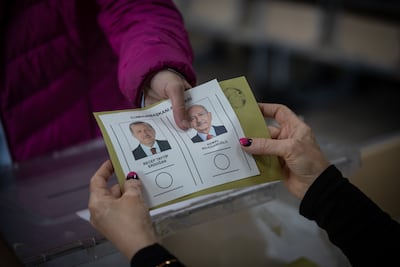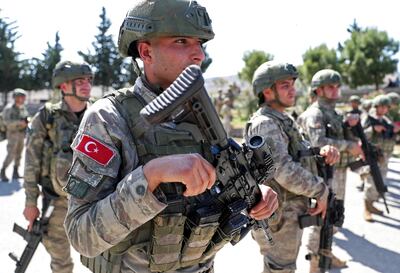They might be headed to the mosque, coming home from work, running errands, or visiting an administrative office. Whatever Syrian refugees in Turkey may be doing, moving about in public increasingly exposes them to being detained, transported to a detention centre and forced to choose between staying there indefinitely or signing a “voluntary return” letter.
Since Turkey’s May elections, several new reports have documented this treatment in painful detail. There’s Khaled Ahmed, who after living in Istanbul for eight years went to the migration office to update his address and soon found himself in the Syrian city of Azaz, wondering if he would ever see his wife and children again.
There’s Saeed and his sons, who after living in Istanbul for nearly a decade were accused of violence against a fellow Syrian and transported to one detention centre after another until they reached Hatay, near the Syrian border. They believe that only the devastating February earthquake, which flattened the centre, leading to their release, saved them from deportation.
Almost six months have passed since that disaster eviscerated much of northern Syria and south-east Turkey, and while reconstruction lags, Turkey’s nearly four million Syrians seem to face the toughest road back to normality. Last year, I detailed Turks’ growing animosity towards Syrians, who have been blamed for everything from a wave of petty crimes to increasing rents and deepening economic troubles.
Just this week, Fahrettin Altun, the Turkish Presidency’s communications chief, pointed out that Syrians and other migrants are often blamed for public disturbances of the peace. “The perpetrator of this event is portrayed as a foreign national,” he said in a lengthy Twitter post about disinformation, “although it is not actually the case.”
This is not surprising, as more than eight out of 10 Turks now want Syrians sent home, according to a UN report. Such views were given free rein in the lead-up to the May vote because the opposition’s primary campaign vow was sending all Syrian refugees home. This probably spurred the increase in anti-Syrian hate crimes and hate speech reported by the Stockholm Centre for Freedom.

Once President Recep Tayyip Erdogan secured victory, Syrians heaved a sigh of relief. But Turkey’s longtime leader vowed in his acceptance speech to send a million Syrians home. Within days, the government quietly began rounding up and deporting Syrians. The UK-based Syrian Observatory for Human Rights says Turkey deported nearly 1,000 Syrians in July alone.
If forced, Turkey’s deportations are likely to be in breach of the UN’s 1951 Refugee Convention, assuming Syria remains unsafe, and may also be in violation of Turkey’s 2016 deal with the EU, which both sides have talked of renewing.
Either way, most Syrians in Turkey now dread leaving their homes and are desperately seeking solutions. Some apply for Turkish citizenship and EU resettlement. Some pay bribes to enroll in university. Some stop speaking Arabic in public and even change their names to appear Turkish. Last month, a Turkey-based, Syria-born Islamic scholar issued a fatwa allowing Syrians in Turkey to perform Friday prayers at home rather than visit the mosque and expose themselves to arrest.
But for some, staying home just got more difficult. At the weekend, Turkish authorities gave Syrians who are now in Istanbul after initially registering in other provinces seven weeks to return to their province of registration. This is likely to spur a wave of Syrian movement within Turkey.
For the estimated 600,000 who have been returned to Syria, it’s out of the frying pan and into the fire. Many are said to oppose President Bashar Al Assad and now live in fear for their lives. But keep in mind, they are not being sent back to their homes, but rather to new housing that Turkey is building with Qatari support in Turk-controlled safe zones.
“The construction of briquette houses in northern Syria continues,” Mr Erdogan said last week, explaining that Turkey has built nearly 150,000 homes. “As we have done this, our Syrian refugee brothers have started to return.”
When Syria’s civil war began a dozen years ago, Mr Erdogan took a firm stand against Mr Al Assad and famously welcomed waves of “refugee brothers”, bolstering his regional reputation. Now with the lira tumbling and local elections looming in March, he is adopting policies to deport refugees and reaching out to his Syrian counterpart in an effort to renew ties.
Turkey has two main objectives when it comes to Syria: prevent a further influx of refugees from the four to five million displaced people in north-west Syria; and weaken the Kurdish-led Syrian Democratic Forces’ control of north-east Syria to secure against cross-border attacks.
Ankara, which has about 10,000 troops in northern Syria following four incursions, doubts Damascus’s interest in helping achieve these aims, and for good reason: Turkey’s refugee resettlement vision requires an increased troop commitment in Syria, yet the Syrian government has made Turkey’s withdrawal a condition for rapprochement.

There are additional complications. The first is that the vast majority of northern and eastern Syria – including where Turkey is building homes – is becoming a barren moonscape, as The New York Times put it. Due to climate change, poor irrigation and weak governance, blowing desert sands swallow tens of thousands of acres of arable land every year across the Fertile Crescent. Desperate people are packing up and leaving and communities are fraying, spurring clashes and extremism. The recent expiration of the Russia-Ukraine grain deal, which ensured much-needed food deliveries to hotspots such as Yemen, Syria and Iraq, has only made matters worse.
Yet this might have been manageable had the UN-brokered deal that allowed for humanitarian aid to be transported from Turkey into northern Syria’s Idlib province not expired last month, thanks to a Russian veto in the UN Security Council. Within days, the Syrian government agreed to allow six months of cross-border aid, as long as it could supervise all deliveries.
The UN rejected this condition, but it’s now the reality: the Assad regime and Russia largely control aid deliveries to millions of displaced Syrians. Despite riding high on his recent victory and sailing towards Turkey’s centennial celebrations in October, Mr Erdogan appears exposed, even at the whim of Damascus and Moscow.
If for whatever reason those governments decided to turn off the aid spigot, another wave of refugees could flood into Turkey, undermining Ankara’s efforts to reduce its migrant burden and cutting into the governing AKP’s electoral support. Suddenly, as jobs become even more scarce and belts tighten even further, Turks may see the opposition CHP and its vow to send all Syrians home as the better option, despite the party’s ongoing leadership battle.
Much like the US’s Democrats, CHP support is largely urban, and Turkey’s most recent mayoral elections, back in 2019, represent a high water mark for the opposition, which gained control of most of the country’s largest cities. Syrian refugees are now in the political crosshairs as the AKP attempts to secure a different result this time around.


